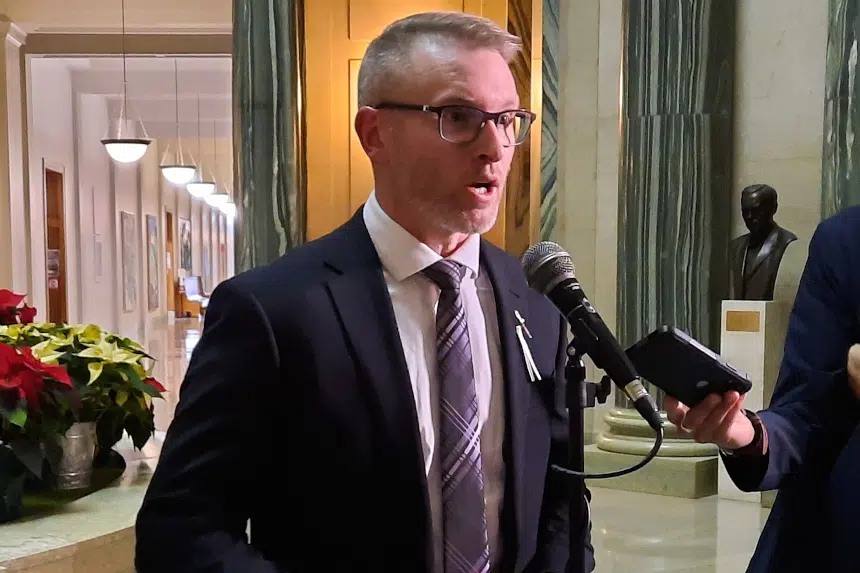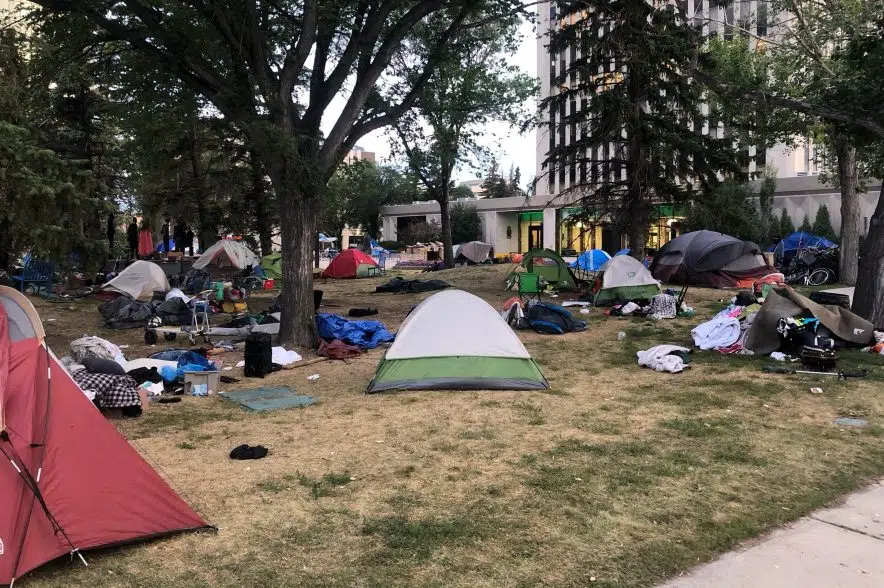For weeks, people who didn’t have anywhere else to go slept and lived in front of Regina’s City Hall.
Many didn’t have other options, even while there might have been shelter or housing spaces available. That’s because in some cases, pervasive mental health and addictions issues make it too difficult for them to follow shelter rules.
In addition to social services issues, the number of people unable to live anywhere else stood as a stark reminder of the mental health and, particularly, addictions issues that have been growing in Saskatchewan.
“It says to me that we still have work that needs to be done,” Everett Hindley, Saskatchewan’s minister for mental health and addictions, said about the existence of the camp.
The minister said the camp was a multi-layered situation and his people, as well as employees of the Ministry of Health, were working closely with Social Services to put out an extra effort to connect people there to services.
Hindley talked about the overdose outreach teams, as well as the community outreach and support teams.
“We know that we did make some of those contacts that way, but our folks on the ground — the frontline, the providers — did everything they could to make sure that they were making those connections with people to help them overcome some of these barriers,” said Hindley.
For those who do want to address their addictions issues, there’s a huge problem with availability of treatment in Saskatchewan.
A wait for something like detox can be weeks with another wait of weeks or ever months after that for any available treatment bed. And treatment outside the public health system can run thousand of dollars.
The cost and wait can be even worse in rural areas and for those on First Nations.
Hindley recognizes the problem and says his focus is on building capacity in spaces for addictions treatment.
“We know we can’t do that quick enough and are trying to build that capacity as quickly as we can, whether it’s through physical treatment spaces themselves and the actual treatment beds and detox beds, but also through the people that we need, the very valuable frontline providers,” explained Hindley.
About a year ago, Hindley made a promise to create 150 new treatment beds in three years. The ministry is about halfway there now, but most of the spaces created have been detox, outpatient, or post-treatment beds.
For those with serious or pervasive issues, inpatient treatment is a more necessary route, and Hindley hopes to add more of those spaces for the second half of the promise.
“I am hopeful that we’ll be able to announce those in the coming weeks and months ahead knowing that that is one of the most integral parts of our addictions treatment and recovery plan,” said Hindley.
However, Hindley also expects that when the province hits the mark of 150 new spaces, it’s still going to have to add more.
Around when Hindley made that promise, the provincial government put out a request for proposals for treatment providers. Four announcement have been held for openings: Two for 26 total post-treatment beds at St. Joseph’s Addiction Recovery Centre in Estevan, one for 36 virtual outpatient treatment spaces from EHN Canada, and one held Tuesday for six short-term detox beds at Bruno’s Place Emergency Shelter in Yorkton.
“A significant overlap exists between people experiencing homelessness and those experiencing mental health and addictions disorders. These detox beds will enhance care for many people experiencing homelessness who also need detox services,” read the government news release on the detox beds.
Hindley admits that things are moving slower than he’d like.
“Of course I would have liked to have seen this happen sooner but I’ve been assured, and it’s something that I have asked for on a regular basis, has been updates on this to make sure that we’re doing everything we can to get these spaces on line as quickly as possible,” said Hindley.
“It’s not because of a lack of interest. Frankly, I think we’ve had very sufficient interest in that RFP. And I think we’ll be able to show some results on that, hopefully fairly soon.”
The minister said he wants to look at everything available, which could mean the Saskatchewan Health Authority opening and running its out spaces. It could also mean partnering with First Nations, but he doesn’t want to discount what’s out there from private providers.
“We want to take a look at everything that might be possible because I think it’s incumbent on us to make sure that we leave no stone unturned when it comes to trying to build treatment capacity in Saskatchewan,” he said.
Since the start of the camp in front of Regina City Hall, both Regina Mayor Sandra Masters and former Regina Police Chief Evan Bray had talked about the idea of mandatory treatment for people with addictions issues who aren’t seeking treatment themselves.
Hindley said he’d heard those comments, but didn’t dive into the idea.
“I think right now if you were to talk to anybody in the area of addictions treatment and recovery, they would say that we don’t have enough treatment capacity, so that when people are there wanting to access treatment, they can’t get in right away,” said Hindley.
He said building capacity is what they’re focusing on right now.












